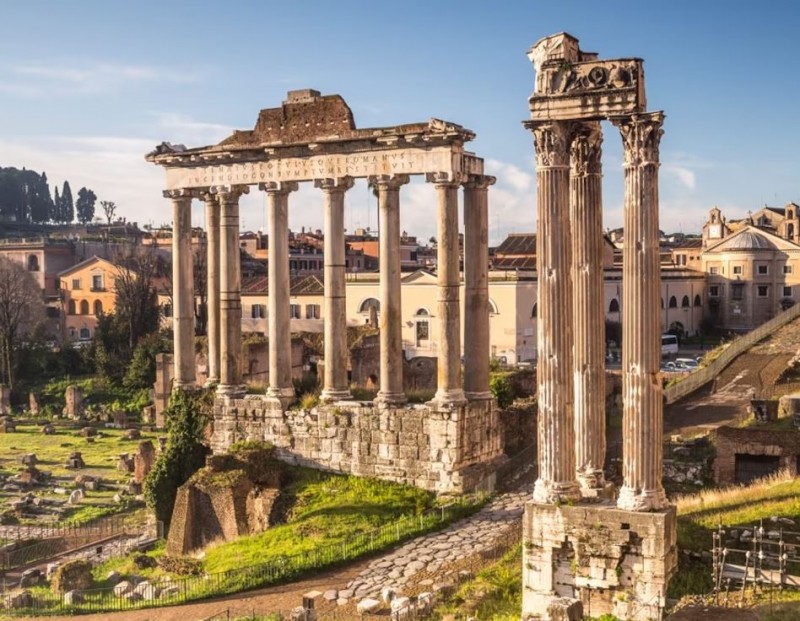
Around the ninth and tenth century B.C. Rome was just small town in the Italy. Ancient Rome, one of the most powerful and influential civilizations in history, has left an indelible mark on the world that still resonates today. Spanning over a millennium, from its legendary founding in 753 BCE to the fall of the Western Roman Empire in 476 CE, Rome's impact on culture, politics, law, architecture, and countless other aspects of human society is immeasurable.
According to legend, Rome was founded by Romulus and Remus, twin brothers raised by a she-wolf. The city grew from a small settlement into a monarchy, ruled by a succession of kings. Rome's early history is shrouded in mythology, making it challenging to distinguish fact from fiction. As the legend goes, the last king was overthrown in 509 BCE, marking the beginning of the Roman Republic.
Also Read: Space Exploration: Past, Present, and Future of Human Spaceflight
The Roman Republic, lasting from 509 BCE to 27 BCE, was characterized by a complex system of checks and balances, with power shared among different offices, such as consuls, senators, and popular assemblies. The Senate, composed of elder statesmen, held significant influence over policy and governance. During this period, Rome expanded its territory through military conquests and formed alliances with neighboring communities.
The Punic Wars (264-146 BCE) were a series of three conflicts between Rome and Carthage, a powerful city-state in North Africa. Rome emerged victorious after these long and brutal wars, solidifying its control over the Mediterranean and expanding its empire across the Western Mediterranean, North Africa, and parts of the Iberian Peninsula.
Also Read: Explore The Cultural Heritage of South Africa
Despite its military successes, the Roman Republic faced internal strife and political unrest. Wealth disparities, land reforms, and the rise of powerful generals, such as Julius Caesar, led to a series of civil wars. In 49 BCE, Caesar crossed the Rubicon River, igniting a civil war that ultimately resulted in his rise to absolute power.
In 27 BCE, after the defeat of Mark Antony and Cleopatra, Caesar's adopted son Octavian (later known as Augustus) became the first Roman Emperor. This marked the beginning of the Roman Empire. Under Augustus and subsequent emperors, Rome experienced a period of relative peace and stability known as the Pax Romana, which lasted approximately 200 years.
Roman society was hierarchical, with the emperor at the top, followed by senators, equestrians, common citizens, and slaves. Roman culture was heavily influenced by the Greeks, with significant contributions in literature, art, philosophy, and architecture. The Colosseum, the Pantheon, and aqueducts are among the remarkable architectural achievements of ancient Rome.
Also Read: Normandy: A Historical and Picturesque Journey
The Romans made substantial contributions to law and governance, and their legal principles formed the basis for many modern legal systems. Roman law emphasized principles of fairness, justice, and the rights of individuals. The Twelve Tables, a set of laws inscribed on bronze tablets, played a foundational role in Roman law.
During the 3rd century CE, the Roman Empire faced numerous challenges, including economic crises, military threats, and internal instability. Despite attempts at reforms, the empire's decline was irreversible. In 476 CE, the last Roman emperor of the West was deposed by Germanic chieftain Odoacer, traditionally marking the end of the Western Roman Empire.
Also Read: Ultimate Packing Tips for an Unforgettable Trip to XYZ Destination
Though the Western Roman Empire fell, the Eastern Roman Empire, known as the Byzantine Empire, continued to thrive for nearly a thousand years. The legacy of ancient Rome can be seen in modern languages, government structures, architecture, engineering, and cultural practices. Roman ideals of citizenship, justice, and governance continue to influence societies across the globe.
Ancient Rome's impact on the world is profound and enduring. From its legendary origins to its establishment as a global superpower, Rome's influence on politics, law, culture, and architecture has shaped the course of human history. Its legacy lives on in the modern world, a testament to the enduring power of this ancient civilization.
Also Read: Marseille, France: Remarkable Cultural Diversity
The Enchanting Charm of Provence: A Journey Through Time and Beauty
Engaging Your Audience: 15 Unique Lifestyle Blog Post Ideas for Success